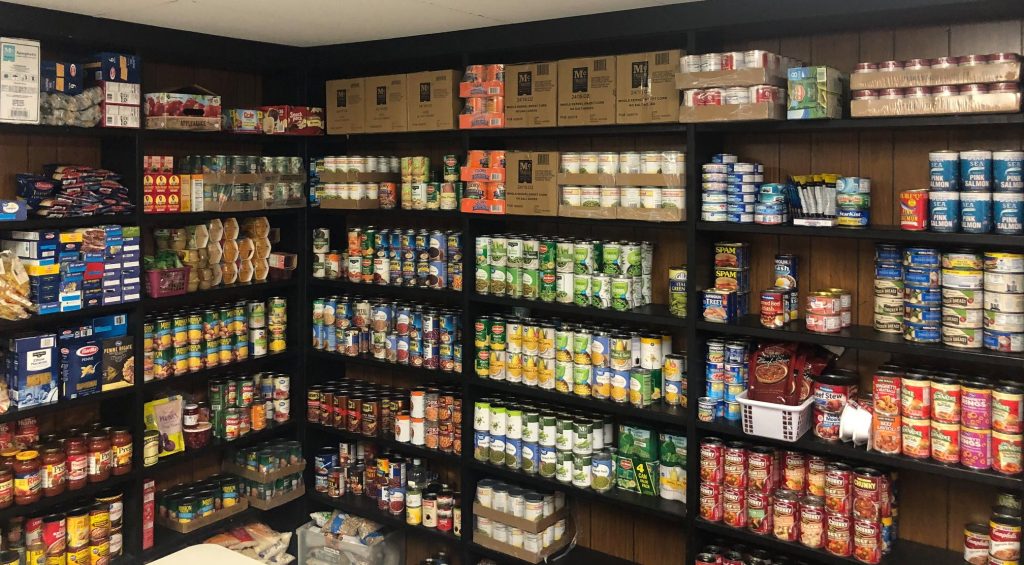Why Food Pantry Lockhart is a Vital Resource for the Neighborhood
Why Food Pantry Lockhart is a Vital Resource for the Neighborhood
Blog Article
Why Sustaining Your Neighborhood Food Kitchen Is Important for Aiding Those in Need
The relevance of supporting local food pantries can not be overstated, specifically in the context of food instability, which affects a startling number of people and families within our communities. As we discover the diverse duty of food pantries, it comes to be evident that their impact extends much past merely distributing food.
Comprehending Food Insecurity
Food insecurity influences around 10.5% of households in the United States, showing a significant public health problem that transcends plain appetite. It describes the absence of regular accessibility to adequate food for an active, healthy life. This condition can result in a variety of damaging results, including poor health and wellness, boosted healthcare costs, and decreased scholastic efficiency among kids.
The reasons of food instability are complex, typically coming from economic factors such as underemployment, unemployment, and destitution. Geographical area can likewise play an essential role, with food deserts-- areas with limited accessibility to budget friendly and nourishing food-- exacerbating the concern - Food Pantry Lockhart. Additionally, systemic factors, consisting of social and racial inequities, add to the disproportionate impact of food instability on marginalized communities
Addressing food insecurity is not just concerning boosting food supply; it requires a comprehensive strategy that encompasses financial stability, education, and area support. Food instability not just affects private well-being but additionally has wider effects for societal wellness and efficiency. Recognizing its complexity is important for creating effective interventions and fostering lasting services that make sure all individuals have reputable access to nutritious food.
The Function of Food Pantries
Regional food cupboards function as vital lifelines for families and individuals dealing with food insecurity. They give essential food products to those that might struggle to pay for sufficient nutrition because of economic challenge, unemployment, or unanticipated situations. By distributing food at no charge, these companies help ease hunger and avoid the adverse health influences connected with poor diet plans.
Food cupboards often partner with regional ranches, supermarket, and area organizations to resource a selection of nutritious food things, consisting of fresh produce, dairy, and proteins. This partnership makes certain that kitchen clients get not just food but additionally much healthier alternatives that add to overall wellness.
Additionally, food cupboards function as neighborhood centers, promoting links among residents and supplying a feeling of self-respect to those in need. Numerous kitchens supply extra resources, such as nutrition education and learning and references to social solutions, helping customers browse their obstacles better.
Basically, food kitchens play a multifaceted role in combating food instability. They not just address instant appetite but additionally equip family members and individuals to enhance their scenarios, consequently promoting community strength and cohesion.

Benefits of Sustaining Food Pantries

Sustaining food cupboards not only nourishes those in demand but also strengthens the material of the neighborhood. By supplying crucial food resources, food pantries ease appetite and reduce food instability, which is important for the wellness and well-being of family members and people. Accessibility to healthy food adds to boosted physical wellness, better academic end results for kids, and improved mental health, consequently fostering an extra effective and involved community.
Moreover, supporting food pantries advertises social cohesion. These organizations work as you can look here hubs for neighborhood engagement, uniting volunteers, donors, and receivers in a shared objective to battle appetite. This partnership can break down barriers, foster understanding, and build connections among diverse area participants.
In addition, donations to food pantries, whether in the type of food, funds, or time, boost the local economic climate. Several food pantries focus on sourcing from regional manufacturers, therefore supporting neighborhood agriculture and services. This develops a cycle of assistance that benefits not just those in requirement but the area in its entirety.
Just How to Get Included
Interaction with food kitchens can take several forms, enabling teams and individuals to make a meaningful impact in their communities. Among one of the most direct ways to obtain included is by donating food items. Non-perishable items such as canned products, pasta, and rice are always sought after. Monetary donations are additionally you could try this out important, as they make it possible for food cupboards to buy fresh fruit and vegetables and important materials.
Volunteering your time is one more impactful means to sustain regional food cupboards (Food Pantry Lockhart). In enhancement, consider organizing food drives within your area, college, or workplace team to elevate awareness and gather sources.
Collaborations with regional companies can better improve assistance for food kitchens. By taking these steps, groups and people can considerably bolster the initiatives of regional food kitchens and help those in need.
Community Influence and Connection
Recognizing the profound impact of food pantries on community health is necessary for cultivating a spirit of link and cooperation. Food pantries serve not only as essential sources for those dealing with food instability however also as centers for neighborhood involvement. They combine diverse groups-- volunteers, contributors, and clients-- creating an atmosphere where people can support and connect each other.
The influence of food cupboards extends beyond simple arrangement of food; they work as a catalyst for social communication. By taking part in cupboard efforts, neighborhood members can establish relationships that transcend socioeconomic obstacles. This network of assistance helps to dismantle the preconception frequently connected with food help, promoting an environment of acceptance and understanding.
As people unite in their initiatives to sustain neighborhood food kitchens, they grow a feeling of common function and duty, strengthening the idea that everyone has a look at here role to play in ensuring that no one goes starving. Ultimately, sustaining food kitchens enhances the fabric of the area as a whole.
Conclusion
Supporting local food kitchens is vital in combating food instability and enhancing the health of vulnerable populations. By making sure access to nourishing food, these organizations add to improved health and wellness end results, instructional efficiency, and mental wellness. Engagement with food kitchens cultivates community connections, advertising social cohesion and equity. Inevitably, the cumulative effort to reinforce these crucial resources plays a significant duty in building a healthier, extra resistant society where all individuals have the possibility to grow.

Report this page